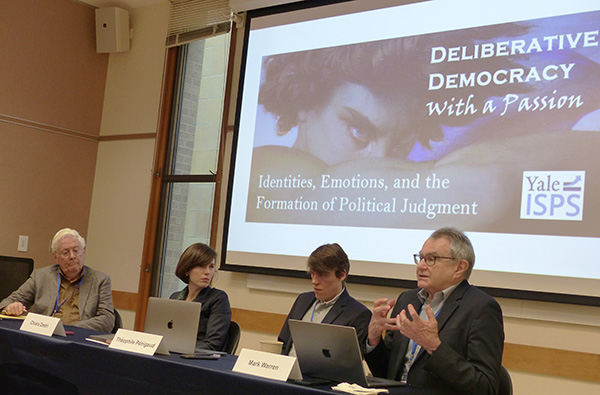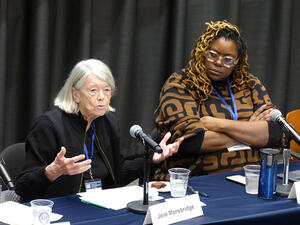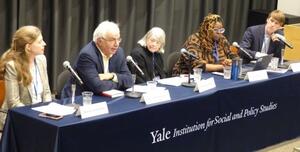ISPS Conference Explores Emotional Bonds and Deliberation in Democratic Reform

Conduct a Google image search for “democracy,” and you will mostly find raised hands, campaign signs, voting booths, and ballot boxes. But political scientists aligned with the concept of deliberative democracy imagine an ideal beyond electing representatives to make decisions on behalf of voters.
In this ideal, citizens engage in a fair, inclusive, and transparent exchange of arguments to arrive at better-informed decisions granted greater legitimacy through the process.
“Most citizens are instinctively committed to such an ideal if it means motivating political decisions by a collectively scrutinized set of reasons,” said Théophile Pénigaud, a postdoctoral associate with Yale’s Institution for Social and Policy Studies. “Even the more dogmatic voters don’t want their influence to rely on false beliefs. They just don’t believe their beliefs to be false.”
The problem, according to Pénigaud, lies in the relative vagueness of this commitment.
“It is sometimes difficult to translate this ideal into concrete institutional arrangements and practices,” he said. “Beyond outright violations of the rule of law, how can we know when reality diverges from the ideal and then improve political systems accordingly?”
Governments, primarily in Europe, have begun expanding deliberative mechanisms, such as citizens’ assemblies, polls, and public consultations. But widespread misinformation, oversimplifications, and polarization — exacerbated by technology — imperil their capacity to succeed on a large scale. And in recent discussions of democratic theory, a realist viewpoint has grown in prominence, emphasizing that political judgment is often dominated by personal identities and cognitive biases rather than being based on information.
Pénigaud and ISPS faculty fellow Hélène Landemore organized a conference last month to explore the latest research on how emotion and identity can influence the formation of political judgment in deliberative set-ups: Is it still possible for political decisions to be rendered more rational and mutually justified, by more deliberations and debates?
“It was a tremendous honor to convene such a distinguished group of scholars focused on this vital political question,” Pénigaud said. “More than ever, grounding political authority on mutual justification and reason-giving is no small challenge. Still, I firmly believe we cannot be content with the status quo.”
The conference was co-sponsored by ISPS’s Democratic Innovations program, aimed at encouraging bold exploration of new approaches to democratic governance. Recent Democratic Innovations events have included an exploration of the impact of artificial intelligence in government, the dynamics of political power in democracies, and how to regulate and govern with AI.
The “Deliberative Democracy — With a Passion” conference included a discussion on how deliberation affects voting, with Pénigaud, Christopher Achen of Princeton University, Chiara Destri of Goethe University, and Mark Warren of the University of British Columbia; on emotions and reason in political judgment with Dimitri Courant of Harvard University, André Bächtiger of Universität Stuttgart, Dimitri Landa of New York University, and Amanda Weiss and Bryan Garsten of Yale; on the politics of emotions, with ISPS Democratic Innovations postdoctoral fellow Antonin Lacelle-Webster, Lala Muradova of the University of Southampton, and Steven Smith and Hélène Landemore of Yale; and on political judgment, future, and imagination, with Warren, Lacelle-Webster, Deva Woodly of Brown University, and Jane Mansbridge of Harvard.
The conference culminated with a roundtable discussion on the future of deliberative democracy in the context of polarization and artificial intelligence, with Bruce Ackerman of Yale Law School, Bächtiger, Mansbridge, Woodly, Landemore, and Pénigaud.
Overall, participants agreed that scholars should incorporate reason and emotions into the study of the formation of rational political judgments.
“Democracy — in the U.S. for sure, but not only in the U.S. — is in bad shape,” Warren said. “We’ve got political polarization, political gridlock, and declining trust in government in many countries. So, we have a duty as political scientists to figure out how we’re going to patch up, recommend, undergird, reform, and reimagine. But we need to do this without utopianism. Realistically. That’s what I like about the configuration of this workshop. We can imagine all we want, but it needs some place to land.”
Woodly, the author of “Reckoning: Black Lives Matter and the Democratic Necessity of Social Movements” and “The Politics of Common Sense: How Social Movements Use Public Discourse to Change Politics and Win Acceptance” doesn’t usually focus on the psychological aspects of political behavior. She viewed the ISPS conference as another opportunity to explore practical means of harnessing the power of people to govern themselves.
“I’m interested in government from below,” Woodly said. “That means figuring out the kinds of practices, mores, values, beliefs, and systems that can encourage ordinary people to organize themselves toward self-governance.”
Woodly said she appreciated attending a conference where theorists could grapple with the practicalities of working toward the ideals they might imagine.
“I think it’s important to consider the context of inequality, domination, oppression, environmental catastrophe, and the retrenchment of ethno-nationalisms of various kinds all over the world,” she said. “What do we do now? I think that’s where the importance of power comes in. And what I’m really happy to see is that the people at this conference are interested in examining alienation and not apathy. Because what’s happening now is not apathy. It’s happening because people have not been able to participate in collective self-governance for a long time.”
Achen presented data analyzed with Princeton graduate student Lewis Krashinsky on referendums following Canadian citizens’ assemblies, concluding that the more information people had about the proposals, the more likely they were to vote in accordance with their preexisting partisan affiliations.
“Deliberative theory is very much in the liberal tradition, but what happens when it encounters real voters?” Achen asked. “The reasons people give for their views are the slaves of their passions, and giving them more policy information just doesn’t change their minds. This kind of behavior by voters is very common. So, the idea that we ought to appeal to cool reason to overcome self-interest just doesn’t work.”
Landemore discussed her experiences observing participants form emotional bonds in the 2019-20 French Citizens’ Convention for Climate.
“I could call it empathy or sympathy or solidarity or friendship,” Landemore said. “But to do justice to what I saw and the ways in which citizens spoke of their bond and manifested it, I have to call it love. Powerful, nonsexual affection for others.”
She recounted conversations with participants expressing their love for fellow participants who might have even been disruptive to experts and when expressing their opposing opinions. She said in the structured deliberative setting, love keeps people engaged, enhances their capacity to think, makes people more receptive to the better argument, and helps bridge the gap between majorities and minorities.
“Not only does love appear to be a precondition for the properties of deliberation in this context, I think it’s an orientation to the truth or the common good that allows the participants to fall in love with each other,” Landemore said. “In citizens’ assemblies, it seems possible to fall in love across partisan divides and different beliefs. Love brings people together.”
Finally, several solutions were explored to improve and scale up deliberative democracy.
Mansbridge explored the difficulty of conveying to non-participants the reasons behind the decisions made in deliberative citizen assemblies, when 100 or so randomly selected citizens gather for a weekend to discuss an important issue and make recommendations to a legislature or administrative agency. She suggested videotaping some of the citizens who had changed their minds on the issue before the citizens, discussing what changed their minds.
“You would have reasons spoken by real people and the way those reasons appeared to them,” Mansbridge said of airing such videos on TV or social media. “For people watching, it might make them feel that they have been heard because someone like them had been heard.”
Ackerman proposed declaring a new national holiday as a day of deliberation, arising about a month before early voting begins. And Bächtiger suggested that effective deliberative democracy simply requires engaging with others, not necessarily justifying reasons at length or even with full respect.
“I think it’s maybe an everyday practice,” Bächtiger said. “The bigger question is where do we realize this practice?”
He said that when he began studying deliberative democracy, he felt “the fervent surge for the perfect or appropriate institutions” to realize the ideal. He eventually settled on what he and colleague John Dryzek of the University of Canberra call discursive infrastructure, meaning all spaces in a society where people communicate directly or indirectly.
“So, deliberative democracy can manifest through interpersonal networks,” Bächtiger said. “It can be at a university where you bump into diverse opinions, start listening, and give your own reasons. Maybe it doesn’t look as radical as others have suggested. Maybe it is kind of a collective type of problem solving that we do every day.”